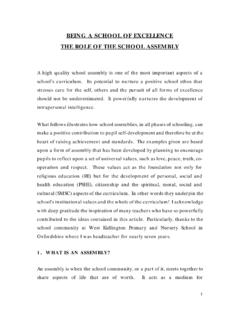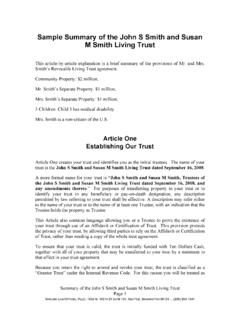Transcription of Living Values Activities for Children, Ages 8-14 ...
1 An Educational Program An Introduction to Living Values Activities for children , ages 8-14 Contents | Introduction | Peace Unit These selected book segments from Living Values Activities for children , ages 8-14 are for viewing by educators and people interested in LVEP's Living Values Activities . !"The Contents page is included to give viewers an idea of other materials within the book. !"The Introduction and one unit of Values Activities are available for viewing. The Peace Unit is the first of twelve Values units. LVEP books are only available for downloading by persons who have taken the LVEP Educator Training. !"For a list of Trainings presently scheduled around the world - click here or go to !"To contact the LVEP Coordinator or Contact Person in your country or region or to request information about future trainings - click here or go to !
2 "Health Communications, Inc. will be publishing five of the LVEP books in the Fall of 2000. Living Values : An Educational Program is a partnership among educators around the world. This program is supported by UNESCO, sponsored by the Spanish Committee of UNICEF, the Planet Society, and the Brahma Kumaris, in consultation with the Education Cluster of UNICEF (New York). Copyright 2000 Health Communications, Inc. All rights reserved. LVEP books are copyrighted and are available for downloading only by persons who have taken LVEP Educator Training. Please contact the LVEP Coordinator or Contact Person in your country or region regarding training. Prior written permission for reproduction of any nature of any LVEP materials must be obtained from the LVEP International Office, unless otherwise indicated in writing.
3 All use of the material must be properly credited. June 2000 Living Values : An Educational Program, Inc. International Coordinating Office, 866 Plaza, Suite 436, New York, NY 10017 USA | CONTENTS SETTING THE CONTEXT The Call for Values 1 What Kind of Program Is LVEP? 1 Aims 2 Current Status 2 Background 3 INTRODUCTION Teaching Values 4 Three Core Assumptions 4 LVEP Trainings 4 A Variety of Values Activities
4 5 Emerge the Values of Your Culture 7 Where Do I Begin? 8 Why Do You Suggest Starting with the Peace and Respect Units? 8 Recommended Order of Values Units 9 When Do I Have Time to Teach Values ? 9 Acknowledgment of Responses 10 When Students Insist They Are Bad 11 Incorporating Values Into the Existing Curriculum 11 Values Web 12 Using Values Activities for Second Language Acquisition 12 Unifying/Summarizing Board
5 14 Symbols Used Throughout the Lessons 15 Students and Educators Share with the World! 15 Values UNITS Objectives, Reflection Points and Values Lessons Index Page 1 Peace 16 2 Respect 39 3 Love 55
6 4 Tolerance 68 5 Happiness 79 6 Responsibility 91 7 Cooperation 102 8 Humility 111 9 Honesty 119 10 Simplicity
7 129 11 Freedom 138 12 Unity 146 Values Fair - Games for a Values celebration or play day. 155 APPENDIX Item 1: Example of a World Cake Peace 159 Item 2: Mind Maps All Values 160 Item 3: Conflict Resolution Steps Peace 161 Item 4: Cool Off Peace 162 Item 5: Lily the Leopard Respec t 163 Item 6: The Two Birds Respect 165 Item 7.
8 Fire in the Jungle Respect 166 Item 8: Situation Cards Respect 167 Item 9: The Four Thrones Love 171 Item 10: The Shorties and the Tallies Tolerance 173 Item 11: The Heart School Happiness 175 Item 12: TC Wants a Dog Responsibility 182 Item 13: The Forgotten Garden Responsibility 184 Item 14: A Meteorite Storm Approaches Cooperation 186 Item 15: Fairy Story A Play Humility 188 Item 16: The Emperor and the Flower Seeds Honesty 190 Item 17: The Miner and the Prince Honesty 193 Item 18.
9 Situation Cards Honesty 195 Item 19: The Naughty Little Prince Freedom 196 Item 20: A Team United Unity 198 Item 21: Relaxation/Focusing Exercises 200 ACKNOWLEDGMENTS Cited Books and Songs 203 Thanks 204 _____LIVING Values : AN EDUCATIONAL PROGRAM ages 8-14 _____ 4 INTRODUCTION Teaching Values he Living Values Educational Program Values Activities are designed to motivate students and to involve them in thinking about themselves, others, the world and Values in ways that are relevant.
10 They are designed to provoke the experience of Values within and build inner resources. They are designed to empower and to elicit potential, creativity, and inner gifts. Students are asked to reflect, imagine, dialogue, communicate, create, write about, artistically express, and play with Values . In the process, personal, social and emotional skills develop as well as peaceful and cooperative social skills. The Values have been arranged to provide a sequentially-based series of skills which build upon each other. The exercises include self-esteem building skills, positive social communication skills, critical thinking skills, and artistic and dramatic expression. Three Core Assumptions There are three core assumptions upon which LVEP is built. The first assumption is drawn from a tenet in the Preamble of the United Nations Charter, To








